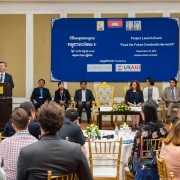
His Excellency Ty Sokun, the Secretary of State of the Ministry of Agriculture Forestry and Fisheries, and USAID Cambodia Mission Director Polly Dunford launched “Feed the Future Cambodia Harvest II” today, a project that aims to accelerate the growth of Cambodia’s commercial horticulture in the provinces of Pursat, Battambang, Siem Reap, and Kampong Thom. The project is funded by the U.S. government’s Feed the Future Initiative through the U.S. Agency for International Development (USAID).
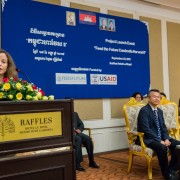
The new Feed the Future Cambodia Harvest II program will aim to accelerate growth in the commercial horticulture sector. We are focusing on this sector because Cambodia produces only one-third of the vegetables that its people consume at this time. The rest of the vegetables come from neighboring countries. Given that the agriculture industry employs over 70 percent of the population, we believe that Cambodia could be producing more healthy and nutritious vegetables to better feed its citizens. That is why we are working with the Cambodian government, businesses, universities here and abroad, and farmers to ensure that Cambodian agriculture can feed the Cambodia people.
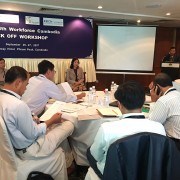
The One Health approach recognizes that the health of animals, humans, and the environment are all linked, and for this reason, confronting health threats requires collaboration across sectors. We need to improve our collaborative thinking. We need to reach across different sectors to help professors to teach and to encourage students to learn. We need to strengthen the connections between pre-service and in-service training. If we do these things, we have an exciting opportunity to change how Cambodian health professionals respond to zoonotic disease threats. We have the opportunity to change not only how faculty look at and teach about these disease threats, but to strengthen and improve the professional skills of the next generation of Cambodian health professionals. We have the opportunity to make a difference in Cambodia’s health security and the security of the Southeast Asia region.
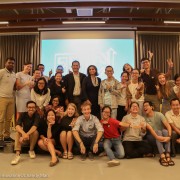
The EPIC social business incubator is one way our Development Innovations project helps Cambodians solve problems with information and communication technologies. EPIC has helped support eleven teams of entrepreneurs to create and grow startups that solve some pressing social problems. They work to address problems like the need for English language teaching resources, the lack of expertise about food safety concerns, and the need for safe housing options for Cambodians who come to Phnom Penh to study or find work. Congratulations to all the teams, and to Impact Hub and Development Innovations, for all the hard work involved with running this program and getting us to today's EPIC Showcase.
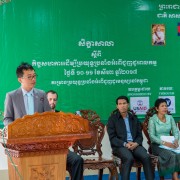
The United States government cares deeply about countering trafficking in persons because it affects not just individuals and their families, but also communities and entire countries, regardless of their location or level of economic development. We know from experience around the world that strong coordination among government, civil society, and the private sector is critical to stop human trafficking. The Royal Government of Cambodia shares our concern and the National Committee for Counter Trafficking has provided the leadership and coordination needed to make real progress against human trafficking.








Comment
Make a general inquiry or suggest an improvement.